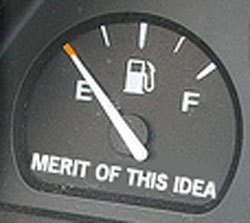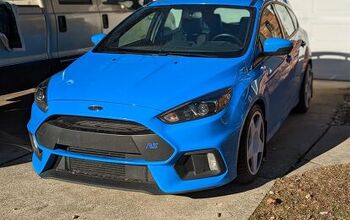Feds Study $4.8 Billion Mileage Tax
Officials are looking to convince residents in the Washington, DC metropolitan region that converting even local streets into toll roads would be good for them. The National Capital Region Transportation Planning Board last Wednesday voted to seek federal gas tax funds to bankroll a $400,000 study on how best to sell the public on a controversial per-mile tax proposal that would raise up to $4.8 billion in new revenue.
“A comprehensive road-use pricing initiative in the Washington metropolitan area would be an extremely ambitious experiment,” Brookings Institution authors Benjamin K. Orr and Alice M. Rivlin explained in a policy paper designed to garner the interest of regional authorities. “Leadership and upfront investment from the federal government would also be essential to get the experiment off the ground and ensure comprehensive implementation. Some recent indications of interest at the federal level suggest that this might be possible. Transportation Secretary Ray LaHood has recently stated that, due to the failure of the Manhattan congestion pricing initiative, the US Department of Transportation still has funds available for pilot congestion pricing programs.”
Brookings, a left-wing think tank, will complete the study entitled, “Public Acceptability of Regional Road Pricing: Can it be Designed to Garner Public Support?” by December 2010, presuming the Federal Highway Administration (FHWA) approves the request. The funds will pay for a series of telephone surveys and focus groups with residents and special interest groups with an eye to determining how best to package ideas that have generated significant public opposition when proposed in other areas around the world.
In the UK, for example, 1.8 million residents signed an official Downing Street petition urging the prime minister to scrap plans to implement a GPS-based mileage tax. In Manchester, 79 percent voted against congestion charging in a referendum last year as 74 percent of voters did in Edinburgh, Scotland in 2005. The proposed Washington toll system raises many of the privacy concerns identified by UK opponents of congestion charging.
“Vehicles would be fitted with a GPS transponder device similar to an E-ZPass, perhaps as part of the registration process,” Orr and Rivlin explained. “This device would record the type of vehicle, the distance traveled, and the time and location of travel.”
Despite the privacy issues, DC officials insist that tolling is necessary for making up for the shortfall in gasoline tax revenues. The proposed mileage tax would solve this problem by increasing motorist taxation levels by a factor of ten. The additional revenue would be diverted to spending on buses and rail service.
“State gas taxes raise approximately $420 million in the Washington urbanized area every year,” Orr and Rivlin wrote. “Revenues from the road-use pricing scheme described above would be between $2.96 billion and $4.79 billion, depending on the average fee… Net revenues could be split between improving mass transit (particularly buses), a need-based refund or discount, and roadway maintenance.”
The federal and state excise tax is only one component of money raised from motorists in the DC and its Maryland and Virginia suburbs. Other taxes imposed on motorists include Virginia’s personal property tax on automobiles, vehicle licensing and registration fees, a tax on car insurance, special taxes on commercial vehicles, as well as parking and speeding tickets. The total of all motorist-related taxes in Virginia exceeds the amount spent on road building and maintenance in the state, according to TheNewspaper’s analysis.
Copies of the tolling resolution and Brookings report are available in a 600k PDF file at the source link below.
Approval of Submission of a Value Pricing Grant Proposal (Metropolitan Washington Council of Governments, 10/21/2009)
[courtesy of thenewspaper.com]
More by The Newspaper
Latest Car Reviews
Read moreLatest Product Reviews
Read moreRecent Comments
- Brian Uchida Laguna Seca, corkscrew, (drying track off in rental car prior to Superbike test session), at speed - turn 9 big Willow Springs racing a motorcycle,- at greater speed (but riding shotgun) - The Carrousel at Sears Point in a 1981 PA9 Osella 2 litre FIA racer with Eddie Lawson at the wheel! (apologies for not being brief!)
- Mister It wasn't helped any by the horrible fuel economy for what it was... something like 22mpg city, iirc.
- Lorenzo I shop for all-season tires that have good wet and dry pavement grip and use them year-round. Nothing works on black ice, and I stopped driving in snow long ago - I'll wait until the streets and highways are plowed, when all-seasons are good enough. After all, I don't live in Canada or deep in the snow zone.
- FormerFF I’m in Atlanta. The summers go on in April and come off in October. I have a Cayman that stays on summer tires year round and gets driven on winter days when the temperature gets above 45 F and it’s dry, which is usually at least once a week.
- Kwik_Shift_Pro4X I've never driven anything that would justify having summer tires.


































Comments
Join the conversation
@mtypex, In Arlington County you pay $25 for the sticker and 5% on the assessed value of the car. However, there is a property tax relief formula that works out to: no tax on the first $3,000 of assessed value, 37% of 5% on $3,001 to $20,000 of assessed value, and the full %5 on any assessed value above $20,000. The assesments are mailed to you by the county and appear to be based on KBB. The valuations seem to be pretty fair.
There's no real lobby groups backing gas taxes, and the oil lobby opposing it. So moronic schemes requiring all kinds of "public works" contracts have a lot higher chance of getting passed, as officials' kids and spouses needs jobs and internships, and officials needs campaign donations, and voters who work for companies getting the majority of their revenue from government contracts. But hey, what's the worry. DC is federal jurisdiction, right? And no one making less than $250,000/year will see a tax hike. And Obama will pay my mortgage, too.